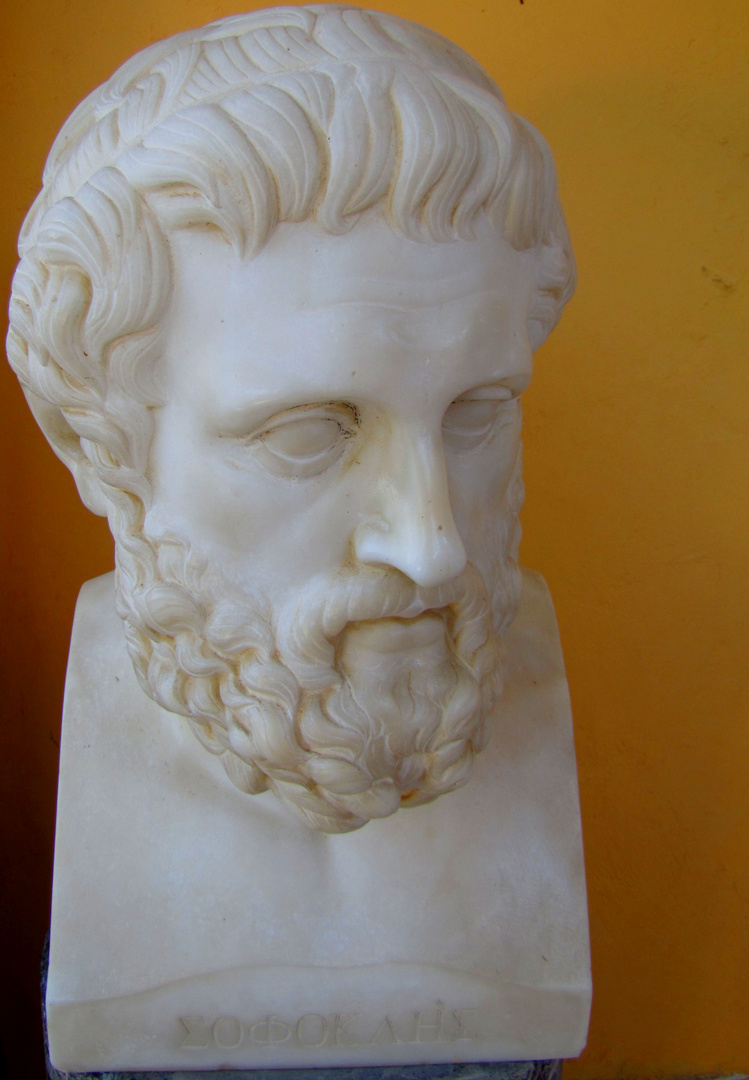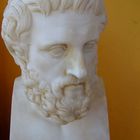SOPHOCLES......
Sophocles was the second of the three ancient Greek tragedians whose work has survived. His first plays were written later than those of Aeschylus and earlier than those of Euripides. According to the Suda, a 10th century encyclopedia, Sophocles wrote 123 plays during the course of his life, but only seven have survived in a complete form: Ajax, Antigone, Trachinian Women, Oedipus the King, Electra, Philoctetes and Oedipus at Colonus.[2] For almost 50 years, Sophocles was the most-feted playwright in the dramatic competitions of the city-state of Athens that took place during the religious festivals of the Lenaea and the Dionysia. Sophocles competed in around 30 competitions; he won perhaps 24 and was never judged lower than second place; in comparison, Aeschylus won 14 competitions and was defeated by Sophocles at times, while Euripides won only 4 competitions.[3]
The most famous of Sophocles' tragedies are those concerning Oedipus and Antigone: these are often known as the Theban plays, although each play was actually a part of different tetralogy, the other members of which are now lost. Sophocles influenced the development of the drama, most importantly by adding a third actor and thereby reducing the importance of the chorus in the presentation of the plot. He also developed his characters to a greater extent than earlier playwrights such as Aeschylus.[4]Sophocles, the son of Sophilos, was a wealthy member of the rural deme (small community) of Colonus Hippius in Attica, which would later become a setting for one of his plays, and he was probably born there.[1][5] His birth took place a few years before the Battle of Marathon in 490 BCE: the exact year is unclear, although 497/6 is perhaps most likely.[1][6] Sophocles' first artistic triumph was in 468 BCE when he took first prize in the Dionysia theatre competition over the reigning master of Athenian drama, Aeschylus.[1][7] According to Plutarch the victory came under unusual circumstances. Instead of following the custom of choosing judges by lot, the archon asked Cimon and the other strategoi present to decide the victor of the contest. Plutarch further contends that Aeschylus soon left for Sicily following this loss to Sophocles.[8] Although Plutarch says that this was Sophocles' first production, it is now thought that this is an embellishment of the truth and that his first production was most likely in 470 BCE.[5] Triptolemus was probably one of the plays that Sophocles presented at this festival.[5]
Sophocles became a man of importance in the public halls of Athens as well as in the theatres. At the age of 16, he was chosen to lead the paean, a choral chant to a god, celebrating the decisive Greek sea victory over the Persians at the Battle of Salamis. The rather insufficient information about Sophocles’ civic life implies he was a well-liked man who participated in activities in society and showed remarkable artistic ability. He was also elected as one of ten strategoi, high executive officials that commanded the armed forces, as a junior colleague of Pericles. Sophocles was born extremely wealthy (his father was a wealthy armour manufacturer) and was highly educated throughout his entire life. Early in his career, the politician Cimon might have been one of his patrons, although if he was there was no ill will borne by Pericles, Cimon's rival, when Cimon was ostracized in 461 B.C.[1] In 443/2 he served as one of the Hellenotamiai, or treasurers of Athena, helping to manage the finances of the city during the political ascendancy of Pericles.[1] According to the Vita Sophoclis he served as a general in the Athenian campaign against Samos, which had revolted in 441 BCE; he was supposed to have been elected to his post as the result of his production of Antigone.[9]
In 420 he welcomed and set up an altar for the image of Asclepius at his house, when the deity was introduced to Athens. For this he was given the posthumous epithet Dexion (receiver) by the Athenians.[10] He was also elected, in 413 BCE, to be one of the commissioners crafting a response to the catastrophic destruction of the Athenian expeditionary force in Sicily during the Peloponnesian War.[11]
Sophocles died at the age of ninety or ninety-one in the winter of 406/5 BCE, having seen within his lifetime both the Greek triumph in the Persian Wars and the terrible bloodletting of the Peloponnesian War.[1] As with many famous men in classical antiquity, Sophocles' death inspired a number of apocryphal stories about the cause. Perhaps the most famous is the suggestion that he died from the strain of trying to recite a long sentence from his Antigone without pausing to take a breath. Another account suggests he choked while eating grapes at the Anthesteria festival in Athens. A third account holds that he died of happiness after winning his final victory at the City Dionysia.[12] A few months later, the comic poet wrote this eulogy in his play titled The Muses: "Blessed is Sophocles, who had a long life, was a man both happy and talented, and the writer of many good tragedies; and he ended his life well without suffering any misfortune."[13] This is somewhat ironic, for according to some accounts his own sons tried to have him declared incompetent near the end of his life; he is said to have refuted their charge in court by reading from his as yet unproduced Oedipus at Colonus.[14] One of his sons, Iophon, and a grandson, also called Sophocle










babylove4uu 05/05/2011 4:58
Hello !!
I Hope you are in good health?
Dear,i wish we could be friendly
in good lovely relationship ,
if you could be sincere and lovely,
well i do cherish your profile
age and distance no problem,
privately send me a
reply to my email address
(rebekahdesmond44@yahoo.co.uk)
while i get back at you including
my picture. I shall hopefully
wait for your reply.
Yours,
REBEKAH BABY
rebekahydesmond44@yahoo.co.uk
THANKS
Vera Shulga 23/09/2010 14:44
Perfect ancient work!Nice presentation!